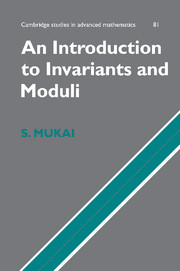Book contents
- Frontmatter
- Contents
- Preface
- Acknowledgements
- Introduction
- 1 Invariants and moduli
- 2 Rings and polynomials
- 3 Algebraic varieties
- 4 Algebraic groups and rings of invariants
- 5 The construction of quotient varieties
- 6 The projective quotient
- 7 The numerical criterion and some applications
- 8 Grassmannians and vector bundles
- 9 Curves and their Jacobians
- 10 Stable vector bundles on curves
- 11 Moduli functors
- 12 Intersection numbers and the Verlinde formula
- Bibliography
- Index
- References
7 - The numerical criterion and some applications
Published online by Cambridge University Press: 05 February 2015
- Frontmatter
- Contents
- Preface
- Acknowledgements
- Introduction
- 1 Invariants and moduli
- 2 Rings and polynomials
- 3 Algebraic varieties
- 4 Algebraic groups and rings of invariants
- 5 The construction of quotient varieties
- 6 The projective quotient
- 7 The numerical criterion and some applications
- 8 Grassmannians and vector bundles
- 9 Curves and their Jacobians
- 10 Stable vector bundles on curves
- 11 Moduli functors
- 12 Intersection numbers and the Verlinde formula
- Bibliography
- Index
- References
Summary
Our aim in this book is to study the Proj quotient, and some applications of this, when an algebraic group G acts on an affine variety X. In fact, as we have seen, this is not a quotient of X, but of its subset Xss ⊂ X of semistable points for the group action, and to get a good quotient we have to restrict further still to the set Xs ⊂ Xss of stable points. But in general this leaves unanswered the fundamental problem of determining whether or not a given point x ∈ X is (semi)stable. Let us review very briefly how, in general, we will answer this question in some particular cases.
(1) In Chapter 5 we have already looked at the action of GL(n + 1) on the affine space of homogeneous polynomials of degree d in n + 1 variables fd(x0, x1, …, xn), and we have seen that all nonsingular forms are stable (Corollary 5.24).
(2) In Chapter 8 we are going to consider the action of GL(r) on the affine space of r × n matrices, and it will turn out that stability and semistability are both equivalent to the condition of having maximal rank (Proposition 8.1).
(3) In Chapter 10, under the action GL(N) ↷ AltN,2(H0(L)), we will see that a point is semistable if and only if it is the Gieseker matrix of a semistable rank 2 vector bundle with determinant L (Propositions 10.69 and 10.70 and Lemma 10.81).
In each of these examples semistability is shown using some explicit semi-invariants – in case (1) the discriminant, in (2) the determinantal minors and in (3) the Pfaffian minors.
Nevertheless, it is possible to determine the (semi)stable points of a group action even without knowing the semiinvariants, and that is what we will discuss in this chapter. It should be regarded essentially as an interlude, though, as the numerical criterion will not be needed in later chapters for the moduli constructions for line bundles and vector bundles.
- Type
- Chapter
- Information
- An Introduction to Invariants and Moduli , pp. 211 - 233Publisher: Cambridge University PressPrint publication year: 2003



